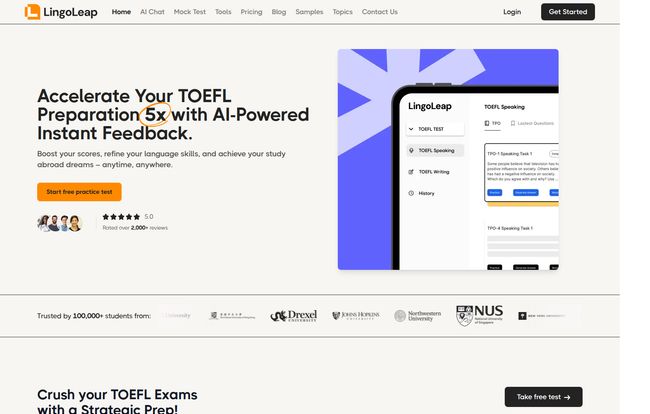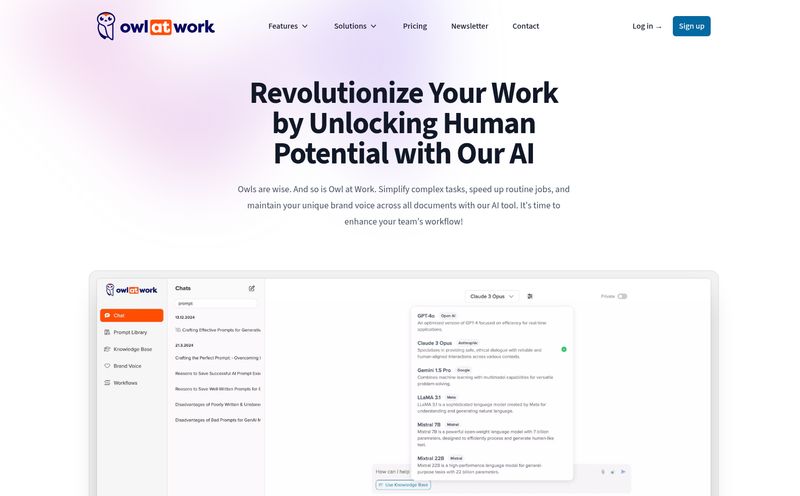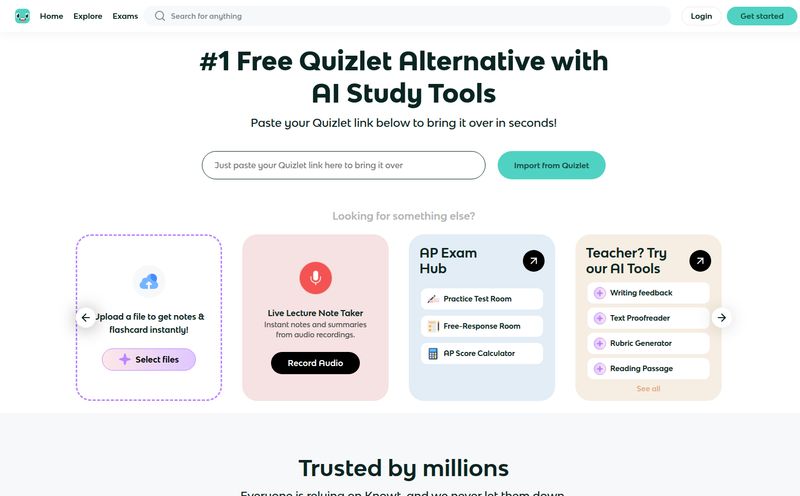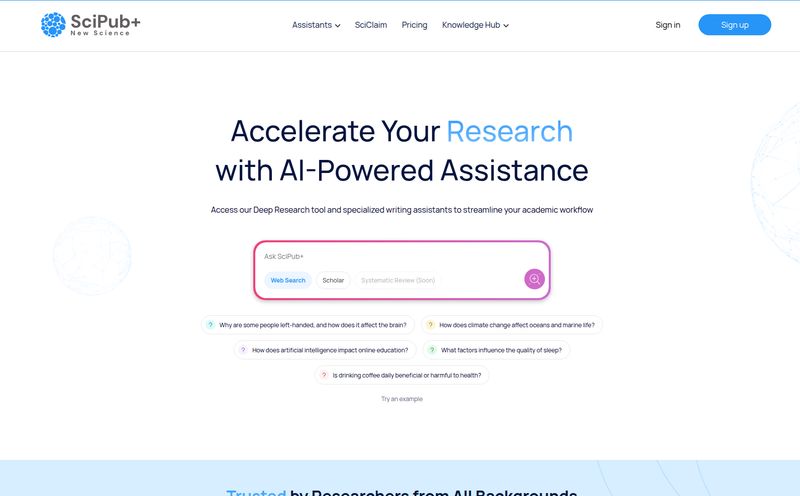If you've ever stared at a TOEFL or IELTS prep book, feeling your soul slowly leak out of your body, raise your hand. Yeah, me too. I've been in the digital marketing and SEO game for years, and I've seen countless platforms promise to 'revolutionize' learning. Most of them are just glorified flashcard apps. So when I heard about LingoLeap, another AI-powered prep tool, my skepticism was, let's say... healthy.
But I’m also a massive nerd for good tech, especially AI that actually solves a real problem. And the anxiety of high-stakes English proficiency exams? That’s a very real problem for millions of students aiming for their study abroad dreams. So I decided to put on my analyst hat and see if LingoLeap is just more marketing fluff or if there’s some real magic under the hood.
So, What's the Big Deal with LingoLeap Anyway?
At its core, LingoLeap is an AI training partner for the TOEFL and IELTS exams. Forget just doing practice questions from a dusty old book. This platform aims to simulate the actual test environment and, more importantly, give you personalized, immediate feedback on your performance. Think of it as a 24/7 tutor who’s had way too much coffee and is obsessed with grammar and lexical diversity.
It’s designed to take you from 'Oh god, I have to give a one-minute speech on the economic impact of potato farming?' to confidently structuring your thoughts and speaking clearly. The whole premise is built on AI evaluation—for both your speaking and writing—to pinpoint exactly where you're going wrong and what you need to do to fix it. Pretty ambitious stuff.
A Peek Inside the Platform: My First Impressions
Jumping into the platform feels clean and focused. The interface, from what I've seen, isn't cluttered with a million useless features. It gets straight to the point. You're presented with practice tasks that look strikingly similar to the real deal. For instance, a speaking task will pop up, give you prep time, and then record your response. It's that element of realism that I think is so often missing from test prep.
But here’s the kicker. After you sweat through your answer, the AI doesn't just give you a thumbs up or down. It hits you with a full breakdown. We’re talking estimated scores, detailed feedback on content, pronunciation, and grammar. It even includes this 'Mind Map' feature which I found genuinely intriguing. It’s essentially an AI-generated brainstorm to help you structure your ideas before you even start speaking. For someone who tends to ramble (guilty), that’s a game-changer. It’s like having a strategic coach whispering a game plan in your ear.

Visit LingoLeap
Breaking Down the LingoLeap Features
Let's get into the nitty-gritty of what LingoLeap actually offers. It’s more than just a mock test machine.
The AI Evaluation Engine
This is the heart of LingoLeap. The personalized AI evaluation is what sets it apart. Instead of getting a vague score from a human grader days later, you get instant, data-driven insights. It analyzes things like:
- Lexical Diversity: Are you using the same five words over and over?
- Grammatical Accuracy: It catches those pesky tense errors and awkward phrasings.
- Content Development: Did your answer actually make sense and address the prompt?
- Fluency and Pronunciation: For speaking tasks, it gives you feedback on your flow and clarity.
It also offers 'Customized High-Score Answers.' This isn't about cheating; it's about learning. The AI can generate an example of a top-scoring response, so you can see what 'good' actually looks and sounds like. It's a fantastic way to reverse-engineer success.
Practice Questions and Mock Tests Galore
You can't get good without practice. LingoLeap claims to have over 1,000 practice questions and mock tests. This volume is crucial. It means you can drill down on specific areas you're weak in or run full-length simulations to build up your test-day stamina. Repetition under realistic conditions is the only way to beat exam day nerves, and this platform seems to provide that in spades.
Let's Talk Money: The LingoLeap Pricing Structure
Okay, the all-important question: how much does this cost? This is where it gets a little interesting. Based on my research, LingoLeap seems to use a credit-based system, and they might be testing different pricing models. So, always check their official pricing page for the latest info!
First off, there’s a Free Trial. You get 500 credits to kick the tires, which they say is enough for about 2 writing evaluations or 5 speaking evaluations. I love a good free trial. It shows confidence in the product.
After that, you're looking at paid plans. I've seen a couple of different structures. One model was a straightforward monthly/quarterly/annual subscription. But the more detailed plan I found was based on a 6-month commitment, which seems geared toward serious students.
| Plan | Price (6-Month Plan) | Key Features |
|---|---|---|
| Free Trial | $0 | 500 credits to start. |
| Plus | $13 / month | 15,000 credits for 6 months, 1000+ practice questions, mock tests, writing/speaking samples. |
| Premium | $32 / month | 30,000 credits for 6 months, everything in Plus, plus unlimited mock tests and exclusive video content. |
The credit system is key here: a writing evaluation might cost 200 credits, while a speaking one costs 50. You have to be strategic about how you use them. It's not an all-you-can-eat buffet, which forces you to be more intentional with your practice.
The Good, The Not-So-Good, and The AI
What I Genuinely Admire
The biggest plus for me is the instant, personalized feedback. That feedback loop is everything in learning. You perform a task, you get immediate notes, you adjust, and you go again. It's how you get better, fast. The convenience of having this on your phone is also a massive win. You can squeeze in practice on the bus, during your lunch break, whenever. The sheer volume of practice material is another huge plus.
A Few Things to Keep in Mind
Now, no tool is perfect. The credit-based system, while encouraging focused practice, can also be a drawback. If you’re a power user, you might burn through credits faster than you'd like. Also, let's be real about AI scoring. While it has gotten incredibly sophisticated, it might have slight variances compared to a human grader from ETS. Think of it as a highly accurate guide, not infallible gospel. It’s there to help you improve your underlying skills, which is the whole point. Don't get too hung up on whether the AI gives you a 24 or a 25; focus on the feedback it provides.
So, Is LingoLeap Worth Your Time and Money?
After digging into it, I have to say I'm genuinely impressed. This isn’t just another flashcard app. LingoLeap feels like a serious, well-designed training tool for a very specific, very stressful problem.
Who is it for? I'd say this is perfect for the student who is serious about hitting a target score. If you've been studying but feel stuck, or if you struggle specifically with structuring your thoughts under pressure for the speaking and writing sections, this could be the thing that pushes you over the edge. It's for the self-starter who wants to practice on their own schedule but needs that expert-level feedback to improve.
It might not be the best fit for absolute beginners in English. This is a test prep tool, not a foundational language learning app. But for its intended purpose? Yeah, it looks pretty powerful. It’s a smart application of AI that could genuinely reduce anxiety and improve performance on test day. And in the world of standardized tests, that's worth its weight in gold.
Frequently Asked Questions About LingoLeap
- 1. How does the credit system in LingoLeap work?
- You use credits to pay for AI evaluations. A speaking evaluation might cost 50 credits and a writing one might cost 200 credits. Your subscription plan gives you a large batch of credits that are valid for the duration of the plan (e.g., 15,000 credits for 6 months on the Plus plan).
- 2. Can I use LingoLeap for both TOEFL and IELTS?
- Yes! The platform is designed to help students prepare for both the TOEFL and IELTS exams, offering practice questions and evaluation tailored to the formats of each test.
- 3. Is the AI scoring really accurate?
- The AI scoring is designed to be highly precise and is based on the official scoring rubrics. While there can always be minor variances, its main goal is to provide consistent, detailed feedback to help you improve your core skills, which is more valuable than the score itself.
- 4. Can I try LingoLeap before buying a subscription?
- Absolutely. LingoLeap offers a free trial that gives you 500 credits to test out the platform's features, including a few speaking or writing evaluations, before committing to a paid plan.
- 5. What makes LingoLeap different from just using prep books?
- The key difference is the instant, personalized feedback. A book can give you questions, but it can't listen to you speak and tell you to improve your intonation or read your essay and point out grammatical weaknesses. LingoLeap's AI acts as a personal tutor to actively guide your improvement.
Final Thoughts
Look, preparing for these exams is a grind. There’s no way around it. But tools like LingoLeap represent a smarter way to grind. It’s about focused, efficient practice with a clear feedback mechanism. It's not a magic bullet, you still have to put in the work, but it might just be the best tool for the job I've seen in a long time. If you're deep in the TOEFL or IELTS trenches, I'd say giving the free trial a spin is a no-brainer.
Reference and Sources
- LingoLeap Official Website: https://lingoleap.ai/
- LingoLeap Pricing Information: https://lingoleap.ai/pricing
- ETS (Educational Testing Service) - TOEFL: https://www.ets.org/toefl.html



